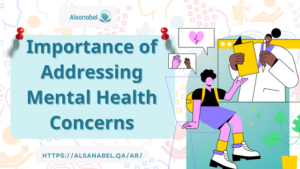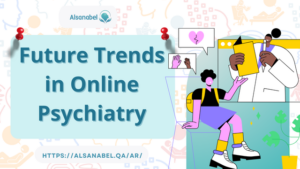Addressing Mental Health Concerns through Online Psychiatry 2024
- Category mental health professional
Addressing mental health concerns during these challenging times is more crucial than ever. With the onset of the COVID-19 pandemic, the rise in mental health problems has highlighted the need for accessible and efficient solutions. Enter telemedicine – a game-changer in the field of psychiatry. Online therapy and counseling offer a convenient and effective way to connect with mental health professionals, providing much-needed support and care to individuals in need. In this age of digital transformation, online psychiatry is paving the way for increased clinical capacity and improved quality of mental health care.
Importance of Addressing Mental Health Concerns
Addressing mental health concerns is crucial for several reasons:

- Improved Quality of Life: Treatment leads to better coping mechanisms, healthier relationships, and increased engagement in daily activities.
- Prevention of Escalation: Early intervention prevents worsening symptoms and the development of more severe disorders.
- Enhanced Physical Health: Mental health treatment improves physical health outcomes by addressing contributing factors.
- Improved Relationships: Treatment fosters healthier communication and relationships with others.
- Increased Productivity: Managing mental health boosts concentration and performance at work or school.
- Reduced Risk of Suicide: Seeking help lowers the risk of suicide by providing support and interventions.
- Positive Coping Mechanisms: Treatment teaches healthy coping skills and stress management techniques.
- Normalization of Mental Health: Addressing concerns reduces stigma and promotes acceptance of mental health issues.
- Cost Savings: Treatment reduces the need for costly interventions associated with untreated conditions.
- Promotion of Overall Well-being: Mental health treatment fosters a sense of purpose, meaning, and happiness in life.
Overall, addressing mental health concerns is vital for individual well-being, relationship improvement, productivity enhancement, and societal burden reduction.
Effectiveness of Online Psychiatry
Online psychiatry services has proven effective in delivering mental health support, supported by various studies and research findings. Its effectiveness stems from several factors:
- Accessibility: It improves access to mental health care, especially for those in remote or underserved areas, by eliminating barriers like transportation issues and stigma.
- Convenience: Offering flexibility in scheduling appointments, individuals can attend sessions from home, saving travel time and accommodating busy schedules.
- Continuity of Care: It enables individuals to maintain care, particularly during challenging times like pandemics or travel disruptions.
- Anonymity and Privacy: Some find it easier to discuss sensitive topics online, fostering openness and honesty during therapy.
- Cost-Effectiveness: It may be more affordable than traditional therapy due to reduced travel expenses and competitive rates.
- Variety of Treatment Options: Platforms offer various modalities like video conferencing and messaging therapy, catering to individual preferences.
- Evidence-Based Practices: Many platforms provide evidence-based treatments like cognitive-behavioral therapy (CBT), known for their effectiveness.
- Quality of Care: Online psychiatry employs licensed professionals adhering to ethical standards, ensuring quality treatment.
However, it’s crucial to acknowledge that online psychiatry may not suit everyone or every condition. Severe illnesses or crises may require more intensive care. Additionally, the quality of services can vary, highlighting the importance of selecting a reputable provider aligned with individual needs and preferences.
Considerations Before Starting Online Psychiatry
Before embarking on online psychiatrist services, it’s vital to consider various factors for a positive experience. Here’s what to keep in mind:
- Licensing and Credentials: Ensure the online psychiatrist is licensed in your area and possesses the necessary qualifications, guaranteeing ethical and legal care.
- Privacy and Security: Verify that the platform adheres to privacy regulations, employing robust security measures to safeguard your personal information.
- Technology Requirements: Have the required technology, like a reliable internet connection and compatible device, and familiarize yourself with the platform’s features.
- Comfort and Convenience: Assess if online psychiatry suits your lifestyle and preferences, considering if remote communication with a psychiatrist feels comfortable.
- Assessment of Needs: Evaluate if online psychiatry aligns with your mental health needs, discussing with the psychiatrist to ensure suitability.
- Insurance Coverage and Costs: Check if your insurance covers online therapy and understand associated costs, exploring affordable options if needed.
- Emergency Protocols: Inquire about emergency procedures during online sessions, ensuring clear protocols for accessing support in crises.
- Treatment Approach and Compatibility: Research the psychiatrist’s approach and expertise, ensuring compatibility with your needs and communication style.
By considering these factors and discussing any concerns with the online psychiatrist, you can make an informed decision and commence your mental health journey effectively.
Types of Online Psychiatry Services
Online psychiatry services encompass various mental health treatments delivered through digital platforms. Here’s a summary of common types:
- Telepsychiatry: Conducts psychiatric assessments, therapy, and medication management remotely via video conferencing, offering real-time support from home.
- Online Therapy/Counseling: Provides counseling and psychotherapy via video calls, phone calls, or messaging apps, offering evidence-based interventions for mental health concerns.
- Medication Management: Allows remote consultations with psychiatrists for medication options, dosage adjustments, and side effects, suitable for ongoing mental health conditions.
- Digital Mental Health Apps: Offers self-help tools, guided exercises, and educational resources for mental wellness, with features like mood tracking and community support forums.
- Online Support Groups: Facilitates connections among individuals with similar mental health challenges through forums, chat rooms, or social media platforms.
- Psychiatric Assessment and Screening Tools: Provides online tools to evaluate mental health symptoms, identify conditions, and determine appropriate care, covering areas like depression, anxiety, and PTSD.
- Crisis Intervention Services: Offers 24/7 hotlines, chat support, or text-based counseling for immediate assistance during acute mental health crises or suicidal thoughts.
These services aim to offer accessible, convenient, and effective mental health care, regardless of location or scheduling constraints, but it’s crucial to select a reputable provider that meets your specific needs.
Future Trends in Online Psychiatry
The future of online psychiatry service is marked by rapid evolution, driven by technological advancements and changing patient preferences. Here’s a summary of future trends:

- Telepsychiatry Integration: Online psychiatry will expand its reach, integrating telepsychiatry services into traditional healthcare settings like hospitals and clinics.
- Artificial Intelligence (AI) and Digital Tools: AI-powered chatbots and digital therapy apps will become more prevalent, offering assessment, support, and immersive VR therapy experiences.
- Personalized Treatment Plans: Advances in data analytics will enable psychiatrists to tailor treatment plans based on individual patient characteristics and response to treatment.
- Remote Monitoring and Wearable Technology: Remote monitoring devices and wearables will track symptoms and behaviors in real-time, aiding in treatment progress and adjustment.
- Virtual Reality Therapy: VR therapy will emerge as a novel intervention for various mental health conditions, providing immersive environments for exposure therapy and skills training.
- Expanded Access to Specialized Care: Online psychiatry will bridge geographical barriers, providing specialized care for underserved populations like rural communities and stigmatized groups.
- Collaborative Care Models: Multidisciplinary teams will collaborate in online psychiatry, offering comprehensive assessment and support for patients with complex needs.
- Cultural Competence and Diversity: Online psychiatry will prioritize cultural competence and diversity, with inclusive care practices and language-accessible platforms.
In summary, the future of online psychiatry promises innovation, accessibility, and personalized care, leveraging technology to improve mental health services and outcomes worldwide.
Thank you for taking the time to learn more about addressing mental health concerns through online psychiatry. It’s important to prioritize mental health and seek the help and support you need. If you or someone you know is struggling, don’t hesitate to reach out to a mental health professional. Remember, it’s okay to not be okay. Take care of yourself and each other.









